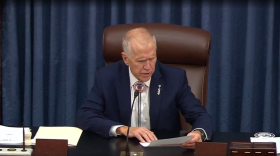In January, President Trump directed his Department of the Interior to come up with a plan for the Lumbee of North Carolina to receive full federal recognition as a Native American tribe.
The move would allow the Lumbee to receive benefits like health care through the Indian Health Service.
The report has not been publicly released, but Lumbee Tribal Chairman John Lowery tells WUNC's Will Michaels he consulted with the Department of the Interior as it was being written.
This conversation has been lightly edited for clarity and brevity.
Have you seen a draft of the report?
We did see a draft report. At the end of the day, I think it's going to say that the most clear and concise way to get this done is going to be through the legislative route, which is the route that we've been on the entire time. So hopefully we will see something done within the next six to seven months.
As you're aware, there are three ways for tribes to receive recognition: through the Bureau of Indian Affairs, federal courts or Congress. But the Lumbee have failed to get a bill through Congress for decades. I suppose one could see this as simply going round and round; that the Department of the Interior is simply passing the buck back to Congress. What's different this time?
What you have to think and look at is this: Indian issues are never a high priority, period. No matter who's in the White House, no matter which party has control, we're still the minority of the minority. Our issues always going to be, you know, at the bottom of anybody's agenda. That's just the truth.
With the Trump administration, the Biden [administration], you know, whoever is coming in, for them to put a tribe forward to say, 'hey, let's look at this issue and provide me with feedback on what is the best way to go,' I mean, that's historic.
I've said it over and over since I became chairman in 2022 the only way to get recognition, clear and concise and without any other legal hold ups, is through legislation. That's been it. And when I talked to Department of Interior, they asked me what was my thoughts? And we went through all the different avenues, and I said, 'Look, guys, at the end of the day, the clear and concise way is the legislation.'
So to me, it's not around and around. It's that somebody came into office and somebody said, 'Okay, I've heard about this issue. I know it's around the Department of Interior. You are the subject matter experts. Look at it. Tell me what's the best way to get full federal recognition done?'
So it's validation for you, then.
Absolutely. That's the word there. It's validation.
The President's memo might hold some weight, but if the Department of the Interior says it's ultimately up to Congress, then it's ultimately up to Congress. Senator Thom Tillis of North Carolina has introduced the latest proposal that would give the Lumbee federal recognition. Given that he's leaving office after next year's election after he drew the ire of President Trump recently, what indications are you getting from Congress that this bill can pass?
There are certain things I'm just not going to say to you out loud, okay, cause I know that people are gonna listen and I can't tell you all of our strategy, okay, but I can tell you this: our leaders in the Senate and our leaders in the House are all working together towards the common cause.
At the end of the day, Will, I mean, this is a home state issue, right? You know, if you're from California or Alaska or or Nebraska, it's not an issue. So it's just educating your fellow senators, educating your fellow House members, telling them about the type of predicament that we're in. And I do think that we are in a good place to get this done before Senator Tillis exits the stage next year.







